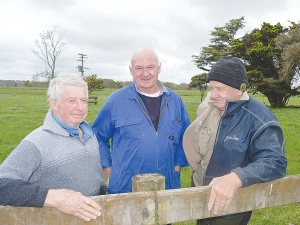Another Windfall for Fonterra Farmers, Unit Holders
Fonterra farmer shareholders and unit holders are in line for another payment in April.
 Fonterra farmers, from left, Jim Cotman, Trevor Simpson and Malcolm Lumsden want the Shareholders Council scrapped.
Fonterra farmers, from left, Jim Cotman, Trevor Simpson and Malcolm Lumsden want the Shareholders Council scrapped.
OPINION: Tension's been simmering among Fonterra shareholders for some time.
Read: A group of Fonterra farmers want the Shareholders Council scrapped.
Some are unhappy with the co-op’s financial performance over the past two years, others are frustrated with the lack of information coming from the board of directors.
A group of shareholders are also venting their anger at the Fonterra Shareholders Council, a 25-member elected body tasked with the role of “representing the views of all shareholders as suppliers, owners and investors”.
It also meets regularly with Fonterra’s board and management to discuss the co-op’s performance.
Two years ago Fonterra shareholders were stunned to learn that their co-op had recorded its first ever net loss after tax of $196 million for the 2017-18 year.
What didn’t help either was confirmation that former chief executive Theo Spierings left with a final year’s salary of $8 million the same year.
Then things got worse. The following financial year, Fonterra posted a net loss of $605 million on the back of asset writedowns worth $826m, mainly on its offshore businesses.
Shareholders like Trevor Simpson, Jim Cotman, Mark Lumsden and Mike Peters of Waikato have had enough.
For them there must be a better and more efficient way for shareholders to keep a tab on their co-op’s performance.
The nasty surprises delivered by the board and management in 2018 and 2019 financial year must end.
Simpson and his group want the council to step up. That’s why the review of the council is crucial for the co-op and its 10,000 shareholders.
They want the council scrapped. Others may not be keen to go that far. But what’s certain is that things must change.
Right now the council has no say in how the co-op is run and the investments it makes both here and overseas.
The council reviews the performance of Fonterra’s investments years after millions of dollars have been poured into dud projects, like China Farms and Beingmate.
Therefore, it’s unfair to blame the council for Fonterra’s investment failures: accountability rests with the board and management.
But Fonterra directors’ hands are tired when it comes to talking directly to shareholders. NZX disclosure requirements means the co-op must deal carefully with market-sensitive information. This is the dilemma facing Fonterra. Trading Among Farmers (TAF) has broken the open and free-flowing communication link between shareholders and directors.
How can this link be restored? Will scrapping the council be enough?
These are the questions shareholders will ponder as they mull the future make-up of the council in the coming months.
Controls on the movement of fruit and vegetables in the Auckland suburb of Mt Roskill have been lifted.
Fonterra farmer shareholders and unit holders are in line for another payment in April.
Farmers are being encouraged to take a closer look at the refrigerants running inside their on-farm systems, as international and domestic pressure continues to build on high global warming potential (GWP) 400-series refrigerants.
As expected, Fonterra has lifted its 2025-26 forecast farmgate milk price mid-point to $9.50/kgMS.
Bovonic says a return on investment study has found its automated mastitis detection technology, QuadSense, is delivering financial, labour, and animal-health benefits on New Zealand dairy farms worth an estimated $29,547 per season.
Pāmu has welcomed ten new apprentices into its 2026 intake, marking the second year of a scheme designed to equip the next generation of farmers with the skills, knowledge, and experience needed for a thriving career in agriculture.
OPINION: Staying with politics, with less than nine months to go before the general elections, there’s confusion in the Labour…
OPINION: Winston Peters' tirade against the free trade deal stitched with India may not be all political posturing by the…